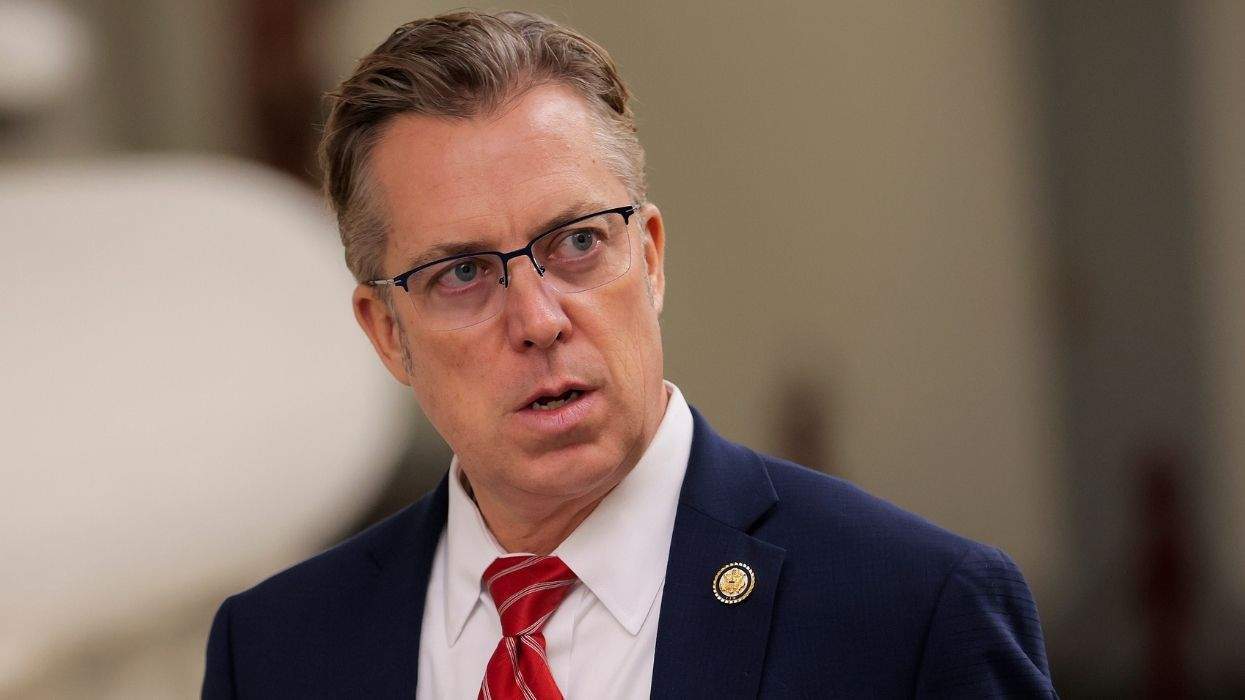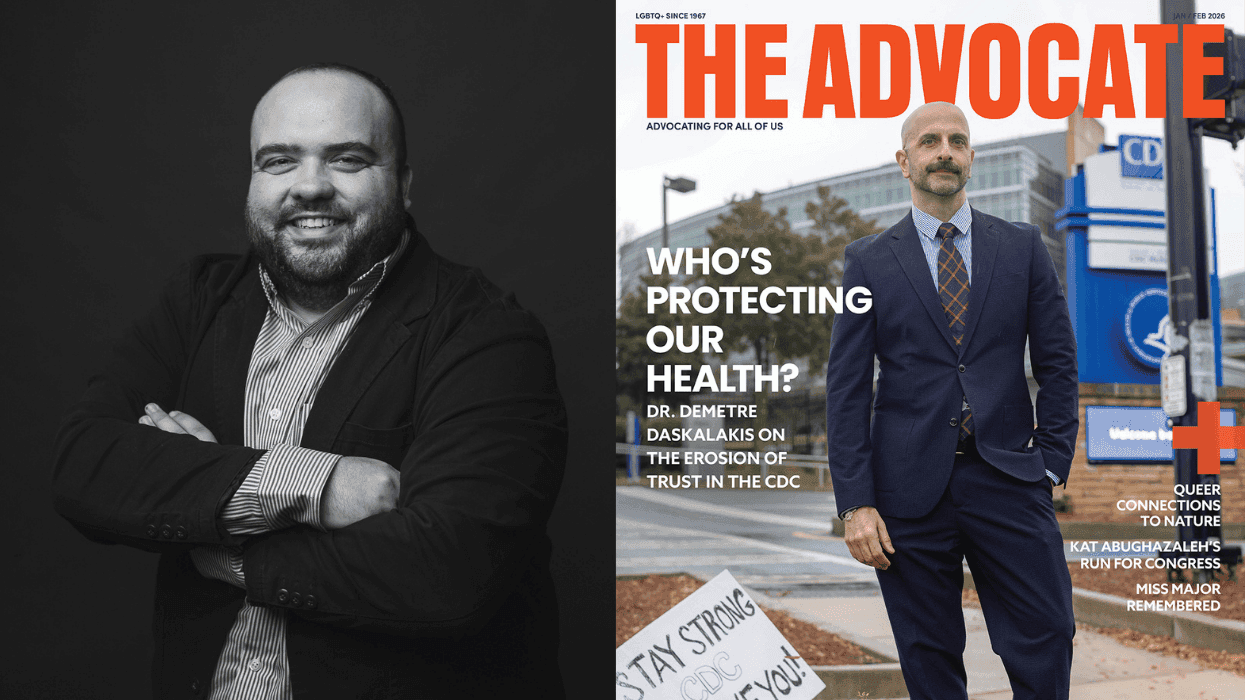Joey Pollari has released "Fickle," the first single from his forthcoming album, About Men.
The 26-year-old actor -- who came out as gay to The Advocate after the release of Love, Simon, in which he plays one of Simon's potential love interests -- described his first foray into music in poetic terms.
"It's about that feeling of desire you have for a lover and the desire has no possibility for definition," he said in a release. "It's like the post-coital conversation when you lie naked on the bed until your lover falls asleep and you see their heap of clothes on the floor and there is suddenly a quiet swell of love, but an absence of understanding."
In the following interview, Pollari, who uses the stage name Odd Comfort, expands upon his vision for "Fickle" and About Men. He also discusses the reasons for his turn to music, how his gay identity influences his art, and his resolve "to fight structures of white supremacy" in the wake of George Floyd's killing.
Additionally, Pollari will donate 15 percent of the proceeds of "Fickle" to bail-out funds at Act Blue's aggregate fund, which supports groups fighting racism and police brutality. The single can be purchased on Apple Music, iTunes, and Google Play.
Watch the video for "Fickle" and read the conversation below.
The Advocate: You're known for work as an actor in productions like ABC's American Crime and Love, Simon. What sparked the turn to music?
Joey Pollari: I started making music as a folding of my cards; I finally gave credence to the kick inside that told me I should be making music. It had been there a long time. I made music privately, for no one, for seven years. Then, after a series of seminal events in my life, first lovers and learning curves that culminated with the passing of my father, I decided to make moves to express that kick publicly. Before this, I had composed for some theater and a web series, but this move to release music I sing and produce is a long-gestating idea.
What do you hope to express with your music that you couldn't as an actor?
The expression in my music is sourced from the same well as when I'm acting, but the screens between that source and the product are different in music. It could be argued that people are hearing less fragmentation of my feeling with the music. But, in acting, lines that are written by someone else also conjure that feeling very well; they can tell your truth for you. It's peculiar. Here on this record, I hoped to lessen the screens between me and the listener; I tried for lyrical and sonic intimacy to relay that hope. In my songs, you get my feeling about my experience, and in acting, you get my feeling through the story being told.
Who are your influences in music?
A scatter of albums that hit me during childhood are all sitting in my subconscious having dinner. My dad played Pink Floyd and The Grateful Dead every other day. My mom played Dolly Parton and Judy Garland and Enya. They probably made my taste. Now, more consciously, a few records and artists are the reason I'm following through. Beth Gibbons, Bill Callahan, Aphex Twin, Arthur Russell, Nina Simone, John Grant are a few that immediately jump in.
What inspired your stage name, Odd Comfort?
Narrative conclusions are evasive and ill-equipped for the continuing story of life; for as long as I can remember, conclusions have not always given me a sense of peace. I wanted a name that I felt could stand for this sentiment -- any feeling that stands up and gives you understanding without a conclusion or ending. I also like the consonants all mashed together. It takes time to say. It's hard even though the concept is soft.
Your first single is "Fickle." What's the story you're telling?
I wanted to make a love song about desire itself. It's fickle and that's why desire lingers, that's the pleasure of it, it always moves. In the verses, I'm tracing scenes in a relationship to try and capture that feeling of love and desire you can't put my finger on. Like when your new lover is asleep before you are, and you see their pile of clothes on the ground and suddenly all the events leading you to that moment come running up. "How did we get here? How did this person arrive in my life? How did my love for them come to be?" Hopefully, this song feels like a soft post-coital moment. This record takes place in the bedroom.
The album is called About Men. Is about any men or man in particular?
It's general and specific. It is general in its attempt to symbolize a commonality, but it is also specific about three men who I loved and are no longer in my life. My father, who passed three years ago, and two other men who I loved very much. I wanted to draw individual stories and also outline some symbolistic unity that I saw. The lyrics bend on that idea.

How does your gay identity and experience factor into the album and its themes?
All the ideas of desire, loss, and longing are queered. The way they arise, are discussed, and emoted are in sight of many queer themes and approaches. The songs are not only about loving and losing men, but queer loving and seeing; we are given an enormous gift as a community to see outside, feel different, and perceive love and time in fluctuating and non-normative styles. The songs range from love to lust, desire to loss, tender to aggressive sexuality. I feel all those things, sometimes many at once.
The television version of Love, Simon, Love, Victor, is debuting on Hulu soon. Will you be watching?
Yes. I'll be watching to experience the growth and expansion on a movie that I am proud to be a part of. I hope the story will reach even more people who can see themselves in its telling.
What was your reaction to its move from Disney+ to Hulu?
I wasn't aware it had moved. I'm curious about the content of Love, Victor to have a clearer vantage point of their decision.
What was the impact of Love, Simon on your life and career?
It changed my life. It became a turning point for how I represented myself publicly and how I interacted with myself and others privately. Beyond this, the movie had a positive impact on people, and I'm very proud to be a part of that impact.
Your only film credit since then is The Obituary of Tunde Johnson, which is about the death of a gay Black man from police brutality. What perspective did making that film give you on this issue, particularly as the country grapples with the death of George Floyd?
The death of George Floyd is so tragic. My heart breaks for his family and for my hometown city of Minneapolis. I'm outraged, as his death, along with hundreds of others by police hands, reiterates racist violence that traces back to this country's origins in oppression and white supremacist violence. Working on The Obituary of Tunde Johnson furthered my understanding that began with reading authors like James Baldwin and Toni Morrison and it highlighted the continuing cruciality of listening to Black voices and artists. I hope people will see the movie and see the brilliant work Ali LeRoi and Stanley Kalu made. My learning will never be done; my understanding is continuing every day to learn and dismantle my own white privilege, to listen more clearly and wholeheartedly to those oppressed, and disengage from and fight structures of white supremacy. We all lose in these defunct and poisoned systems.
What's next for you -- and is acting still in the cards?
Releasing this record and then I'm finishing another one in the next few months. I'm editing music videos and directing another one soon. Acting is and will always be on the table. It is a passion and extension of me, just like music. Two sides of the same coin. Bow and arrow. Full and empty. But I'm thrilled for this music to be out in the world. The music will never be just for me. It is yours to have.
(Related: Love, Simon's Joey Pollari: Every Love Story Is a Coming-Out Story)















Charlie Kirk DID say stoning gay people was the 'perfect law' — and these other heinous quotes
These are some of his worst comments about LGBTQ+ people made by Charlie Kirk.